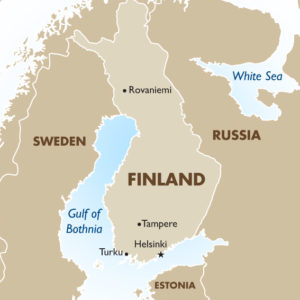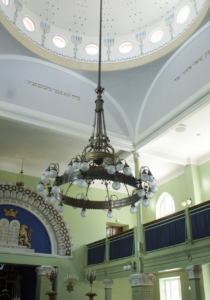 Finland was under Swedish rule until 1809, during which time Jews were banned from living there. When Finland became a grand duchy of the Russian Empire in 1809, Jews who had served in the Russian army and been stationed in Finnish territory were allowed to settle with their families. Jews were finally granted civil rights immediately after Finland became an independent country. In the interwar period, the Jewish population rose to its highest level ever—about 2,000. Many Jews studied at university and entered the professions.
Finland was under Swedish rule until 1809, during which time Jews were banned from living there. When Finland became a grand duchy of the Russian Empire in 1809, Jews who had served in the Russian army and been stationed in Finnish territory were allowed to settle with their families. Jews were finally granted civil rights immediately after Finland became an independent country. In the interwar period, the Jewish population rose to its highest level ever—about 2,000. Many Jews studied at university and entered the professions.
 German soldiers were stationed in Finland, which gave rise to the paradoxical situation of Jews and Germans fighting side by side against the Soviet Union. There was even a “field synagogue” built by Finnish soldiers in which Jews could conduct services alongside SS units. Jewish soldiers were granted leave on Saturdays and Jewish holidays. The Finnish government refused to enact anti-Jewish legislation and protected its Jewish citizens, but eight Jewish refugees were handed over to the Germans. After the war, the Jewish population decreased because of emigration to Israel, and assimilation.
German soldiers were stationed in Finland, which gave rise to the paradoxical situation of Jews and Germans fighting side by side against the Soviet Union. There was even a “field synagogue” built by Finnish soldiers in which Jews could conduct services alongside SS units. Jewish soldiers were granted leave on Saturdays and Jewish holidays. The Finnish government refused to enact anti-Jewish legislation and protected its Jewish citizens, but eight Jewish refugees were handed over to the Germans. After the war, the Jewish population decreased because of emigration to Israel, and assimilation.
Helsinki Synagogue is located in the Kamppi district, and is used by the Jewish community. The number of Jews in Finland in 2010 was approximately 1,500, of whom 1,200 lived in Helsinki, about 200 in Turku, and about 50 in Tampere. Helsinki offers a range of communal activities including a kindergarten, a school, a hospital, a library, a choir, and a great number of organizations.